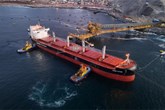CASTALOOP USA expands cargo handling operations with new terminal
Published by Jessica Casey,
Editor
Dry Bulk,
CASTALOOP USA, Inc., a subsidiary of LOGISTEC Stevedoring Inc., has announced the opening of a new terminal operation located in Lemont, Illinois. CASTALOOP USA, Inc. will provide bulk, break-bulk, and project cargo heavy lift customers with seamless marine and cargo handling services on the Illinois River at mile marker 300, connecting to the Mississippi River System and its tributaries.
“By expanding our network of terminal operations at the heart of the USA, we envision to provide a new alternative for the Midwest River system customers to reach new markets while maintaining the trusted cargo care they have grown accustomed to receive throughout our facilities, in support of a strong global supply chain,” said Philip O’Brien, President of CASTALOOP USA, Inc.
The Lemont terminal is strategically located to serve markets in the greater Chicago area with barge-to-truck services, and easily accessed through the interstate highway network. Offering over 13 acres of outdoor storage and 65 000 ft2 of indoor warehousing, suitable for steel, non-ferrous metals, forest products, super sacks and palletised goods, customers will benefit from CASTALOOP USA, Inc.’s commodity-specific cargo handling expertise. The terminal is a central direct link to global markets through the river system.
“Our operations are up and running at Lemont with the recent handling of steel pipe destined for the oil and gas market in the southern USA,” added Mike Taylor, CASTALOOP USA, Inc.’s General Manager at Lemont. “The terminal has available capacity, and we are ready to work with customers to get their products to market safely and efficiently.”
Read the article online at: https://www.drybulkmagazine.com/ports-terminals/25072022/castaloop-usa-expands-cargo-handling-operations-with-new-terminal/
You might also like
NYK Group operates methanol-fuelled bulk carrier for BHP
NYK Bulk & Projects Carriers Ltd has operated the methanol dual-fuel bulk carrier 'Green Future' using low-carbon methanol fuel, achieving an approximately 65% reduction in greenhouse gas compared to conventional fuel.

